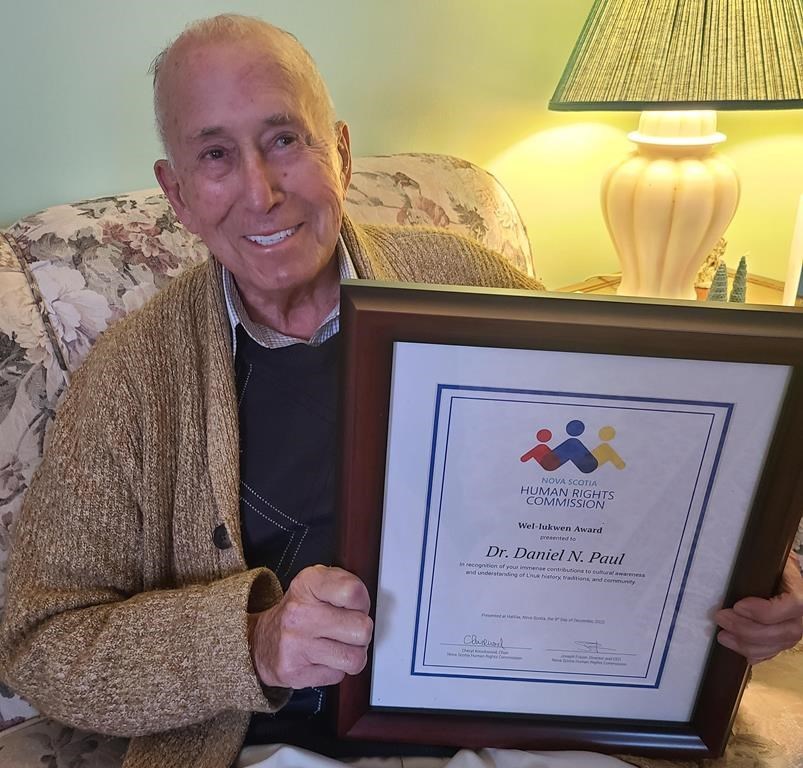HALIFAX — He's 84 years old and receiving chemotherapy treatments for liver cancer, but Mi'kmaq elder and author Daniel Paul says his mission of sweeping away the "fairy tales" of colonial history must go on.
Paul recently completed the fourth edition of "We were not the Savages," published by Fernwood, adding almost 70 pages to the version from 2006, about the relationship between the Mi'kmaq and European newcomers.
During a recent interview, the author said his history book has brought about "incremental" change in public attitudes, though many non-Indigenous readers are just beginning to see that early, romanticized accounts of conquests and explorers have obscured darker realities.
"The more I can do before I go, the better and the less the future generation has to do. And it is education that will make the difference," he said, sitting in his basement study in Halifax.
Despite his health issues, Paul remains in good spirits. He showed off a Christmas email he sent to friends, which said, "It's a little harder to kill off this old goat than first anticipated by the doctors!"
First published by Nimbus in 1993, "We were not the Savages" highlights false equivalencies between Mi'kmaq warriors of the 18th century and the colonial governments, particularly by describing the brutal scalping proclamations issued by the British rulers.Â
Paul's history has helped convince politicians that statues, school names and even a coast guard ship should no longer bear the name of Edward Cornwallis, the first governor of Nova Scotia, who offered "a reward of 10 Guineas" to be paid upon "producing such savage taken or his scalp."
The fourth edition confronts critics who have countered that scalping was common in warfare, with Paul responding that the tactics employed by the governor were not military strategy but a deliberate attack on unarmed Mi'kmaq civilians. Â
Paul says he wants readers to reconsider historical assumptions, such as the simplistic narrative that the Mi'kmaq population declined drastically — reaching a low of 1,300 in 1843 — because of low immunity to European-originated diseases.Â
He offers a "more plausible theory" that the destruction of traditional food resources caused famine, malnutrition and starvation, "which severely lowered resistance to all sicknesses and created ideal conditions for disease to run rampant."
In the new edition — which the writer says will be his last — Paul cites the growing body of research from other scholars to build his case that incivility against Indigenous Peoples lingered into 20th-century Canadian politics. He lays out the well-documented abuse at the Shubenacadie residential school and hones in on the whipping of boys with a "seven-thronged strap" in 1934, sanctioned by school director Rev. Jeremiah Mackey.
Paul quotes from work by a York University political scientist, Karen Bridget Murray, who in 2015 documented how Conservative prime minister R.B. Bennett appointed Louis Arthur Audette to head a Royal Commission of Inquiry — despite Audette's record of racism. Audette's finding — that there was no harm in punishment by "infliction of physical pain" — was accepted by Bennett, permitting Mackey's reinstatement. The process, writes Paul, was "a farce."
Paul said his research began when he was a senior civil servant with the former Department of Indian Affairs and Northern Development from 1971 to 1985, during which time he studied the Indian Act, peace treaties and archival materials.
At times, he played a direct role in the history he's telling.
The elder recalls Chief Raymond Francis, the former leader of Pictou Landing First Nation, coming to his office in 1981 to seek advice on how to get compensation from the province and a pulp company for allowing a mill to deposit industrial effluent in the Boat Harbour lagoon.Â
Paul says he advised the chief, "You're suing the wrong people," suggesting to the Mi'kmaq leader to go after the federal government for dereliction of its duties. Years later, the final settlement for the band was about $35 million.
"Racism is very expensive, as Canada is finding out," Paul said.
But here and there, he sees the signs of acts of reconciliation, such as former Nova Scotia premier Stephen McNeil's 2019 decision to stop the flow of effluent into the Boat Harbour lagoon.
Paul also notes that conflicts over Indigenous self-regulated lobster fisheries — a treaty right created by the Supreme Court of Canada case launched by Donald Marshall Jr. — is an example of how a restoration of Indigenous rights can slowly unfold, with steps forward and backward.Â
The Canadian Press recently reported that about 7,000 lobster traps had been pulled by federal Fisheries Department officers since violence flared between Mi'kmaq and non-Indigenous fishers in southwestern Nova Scotia in September 2020. Meanwhile, eight bands have been licensed by Ottawa to set up self-regulated fisheries.Â
"It's going to be an ongoing thing. It will take time and I think it will eventually be settled equitably between all the parties," Paul said.
Repeatedly, he returns to the theme of the power of education, even if he thinks readers might initially recoil from the harsh realities they're learning about.
On page 434, the author leaves readers with a question to ponder: "Based on what you now know, what is your honest judgment about who the real barbarian savages were when Amerindian and European civilizations collided?"
This report by The Canadian Press was first published Dec. 23, 2022.
Michael Tutton, The Canadian Press




